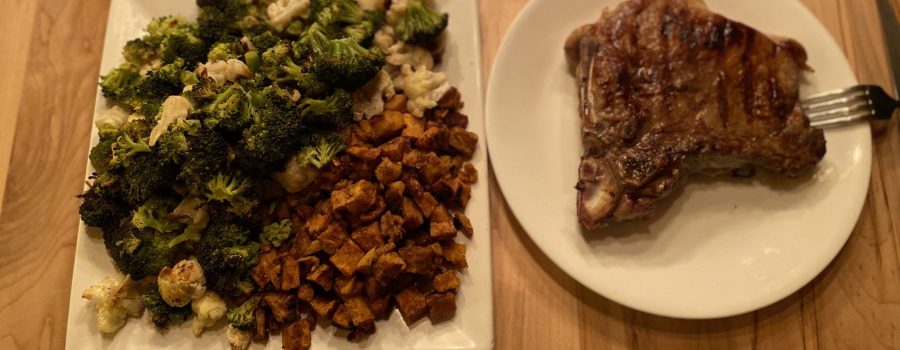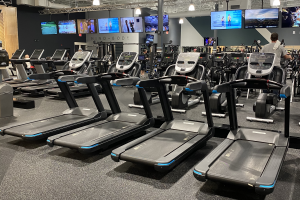The 3 Stages of Creating The Perfect Diet.
As a nutrition coach I spend a lot of time talking about eating and weight management with my clients. You might think that the conversations involve a lot of numbers and specific macronutrient strategies to help them find the exact formula for a perfect diet, but that’s rarely the case.
The vast majority of these conversations revolve around very simple concepts. In fact, I hardly ever spell out a specific calorie or macronutrient allotment for my clients. Most of them don’t need it.
And this is true regardless of the weight change goal. The only difference is assigning a different quantity depending on if you’re trying to gain or lose weight. Outside of that, the process is pretty much the same – create a structure, eliminate the biggest problems, execute consistently.
The other side of this is the fact that people are rarely the outlier. 99 times out of 100, the issue boils down to a lack of consistency or a simple misunderstanding in the way that the systems work.
Please note that this does not mean that the process is easy, by any means. Making a change to the status quo is difficult, even in the best of circumstances. We fall into the patterns, habits, and decisions we make for a reason. The issue is that most of us don’t choose those reasons intentionally.
So even though the process is straightforward, making the necessary changes in your mindset and environment is fraught with challenge. The first step is walking through those unknown “unknowns” and finding out where you are treating hypotheses as facts.
And that is precisely where a good coach comes in. Someone to hear you objectively, mirror back what you’re saying, and then work with you as you come up with a better solution. Meal plans can help, but they are often more of a band aid, symptom treatment to the true problem.
Eating is a deeply emotional experience for many of us. A stress reliever for some, a reward for others, and a communal bond for most. So making changes in our diet and eating patterns generally revolves around adjusting the emotional and psychological factors that feed into our nutrition.
Yes, I know that sounds like some deep stuff, and it is. This is the simple reason that so many people experience frustration around a lack of success with weight gain or loss. It’s easy to feel defeated when you know everything you should be doing yet struggle to actually implement.
Some will internalize this as a personal shortcoming and reflection on themselves. This only serves to create more shame and negative self-talk. However, those are rarely beneficial and oftentimes result in a further spiraling downward of their decision making. If you’ve experienced this then you know what I’m talking about.
Clearly that approach doesn’t work. The first step out of it is to accept that difficult does not mean easy. Accept that this is a hard process and change will require certain actions that may not seem intuitive to you at first. Once you swallow that pill mentally, you’ll be able to surround yourself with the support and structure you need to actually be successful.
Ego is what prevents us from asking for help for the things that we label as easy, or areas that we think we should be able to handle on our own. And as long as we let that ego run the show, we’ll stay stuck.
When you step back and move into a beginner’s mind, you can see things through a new lens. Simple, effective, and manageable changes that will create the change you want. The second you become impatient with process or begin to skip steps that seem too small or easy you will become stuck again. Progress is accomplished by consistency through simplicity. Anything else creates complexity which kills destroys growth.
Now, I know that was a lot of heady, intangible stuff, but it’s important to lay out the foundation. The actual process is simple, but if you’re in the mindset of glorifying complex, you’ll miss it. If you’re ready to embrace what I’m about to lay out for you, then you can make any change you want. If you read it and think “That’s not going to work for me, I have X problem” then you’re still holding onto the ego.
I’ve established a 3-stage protocol for maximizing your eating and nutrition. This has worked for me and dozens of clients I’ve worked with over the past several years. This is a baseline progression that is important whether you want to gain muscle or lose fat. For most people, just consistently making the change in stage 1 will be enough to see 80% of the desired results.
If you want to continue to lose weight, lean out, or sharpen your physique then you can progress to the next phases. Don’t try to do this all at once, allow 2-3 weeks of consistent adaptation before adding in more complexity!
STAGE 1 – The Big 3: NO Sugar, NO Snacking (Mindless eating), and NO Drinking calories.
- No Added Sugar – To be even more clear, NOTHING SWEET. If you really want to make this effective, cut out or limit fruit consumption as well. Yes, I know fruit is “healthy” but after generations of genetic farming, it’s bigger, sweeter, and more readily available than ever before. Think of it as a natural desert, not a snack.
- No Mindless Eating – Condense all eating to only meal times.
- No Drinking Calories – Just water. Tea and coffee are fine if they are plan. NO artificial sweeteners, diet sodas, or flavored drinks. The point is to break the sweet tooth. No Smoothies, no sports drinks, no juices. Liquid calories are not natural after mother’s milk. **The only exception here is drinking protein shakes if you’re looking to gain muscle.
STAGE 2 – Cut Out Empty Calories: Limit your meals to Meats, veggies, and starches.
- Meal Plan Recipe: Meat + Veggie + Veggie + Starch.
- If you’re not exercising or training, then cut out the starch and stick to just meat and veggies. The carbs are meant to be fuel for training.
- Essentially only eat foods that are whole, less processed, and high in nutrients.
STAGE 3 – Refine Food Choices: Opt for higher quality foods, less toxins, and additives.
- Choose organic veggies, grass fed/wild caught meats and dairy, and pasture raised eggs.
- The healthier and more sustainably raised the food is, the better for the planet and the higher quality food you’ll get.
- This gets more expensive, but for maximizing your health, it’s absolutely worth it.
Start with stage 1. At minimum, just focus on this for 3 weeks. If you’re seeing positive changes in your energy and weight then good! Keep going! When that slows down, becomes second nature, or you decide to push further, then move to stage 2 while keeping the stage 1 structure. You build on top of it.
The point is not to quantify your life in terms of macros and calories each day, the point is to create a framework for eating that makes it hard to fail. Those 100 Calorie Packs are about the most depressing things I’ve ever seen before. A few crumbs of Oreos is all you get before you’ve hit your limit.
If you eat like this 6 days a week, you will have more than enough leeway for a flexible off day to enjoy whatever food or drink you fancy, and you shift the majority of your habits and choices towards a healthier set. This makes a significant change in your cravings and desires over time.
I don’t count calories, measure portions, or stick to a certain macronutrient allotment. I just eat simple, whole, less processed foods (a lot of them) and stay away from the negative or empty calories. That’s it.
And unless you’re a bodybuilder or someone looking to make extreme changes to their physique, I feel confident in saying that these three stages are all you need to implement too. Don’t believe me? Try it for a month and see what happens.




